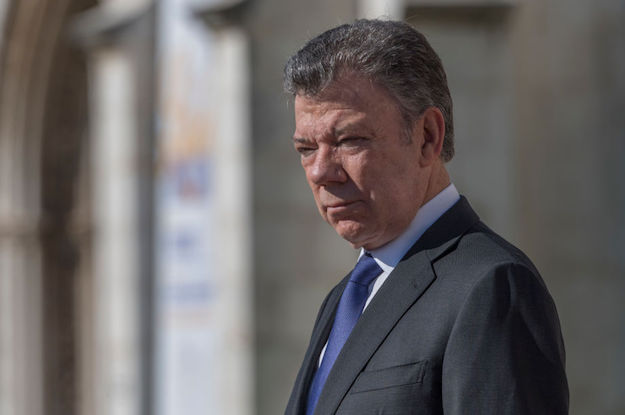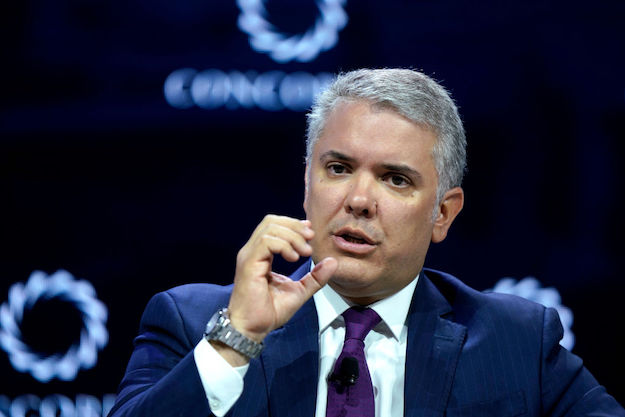In the 14 months since Colombia’s Congress signed off on peace with the FARC, President Juan Manuel Santos has had plenty to celebrate. Hostilities effectively ended, the rebels disarmed and legislators passed a bill allowing the FARC to turn itself into a legitimate political party.
But with legislative elections coming in March and a presidential vote set for May, legal challenges and electoral calculation have stymied Santos’ efforts to implement key elements of the agreement – highlighting the still fragile nature of Colombia’s peace. As his time in office comes to a close, the fate of Santos’ signature achievement could fall to a succesor with a vastly different view of the deal from his own.
According to Kyle Johnson, a Colombia specialist at the International Crisis Group, that could mean significant changes to the agreement that in 2016 put an end to more than 50 years of conflict between the FARC and Colombia’s government.
“The most likely scenario is a peace agreement that is able to disarm the FARC, give them what they need to consolidate their disarmament and then not follow through on social and economic reforms,” Johnson told AQ.
Indeed, many elements of the deal that have yet to be implemented, from special congressional seats for conflict zones to financial support for rural farmers, pertain to long-standing grievances of the countryside that gave rise to the FARC in the first place.
Political representation is one example. Part of the agreement that called for the creation of 16 congressional seats for victims of violence received a cool reception on the Senate floor in November, garnering only 50 out of 102 votes. The Santos administration is now challenging the result in a high court, arguing that 50 votes constitutes a majority because three senators are currently suspended on corruption charges. However the court decides, it is clear that Santos, whose approval rating now hovers around 14 percent, is running out of political capital.
“The government promised a lot of things in a negotiation that they have been unable to see through in the legislative process,” said Sergio Guzmán, a political risk consultant for Control Risks.
According to the Kroc Institute, a think tank, Colombia’s Congress has so far approved eight legislative initiatives tied to the peace accords. But legislators are still reviewing 12 peace deal laws, including one that would give deferential legal treatment to coca growers, and another to create a national system for agricultural innovation.
Part of Santos and his allies’ difficulty in getting these elements of the deal passed, said Guzmán, is a Constitutional Court ruling that gave Congress greater power to amend legislation related to the peace deal, as well as the ability to vote on each amendment made to legislation separately.
The ruling gave opposition parties in Congress more power to stop areas of the deal they disagreed with, like a transitional justice system that would investigate war crimes committed by the FARC and by Colombia’s military. That element of the deal also sparked heated debate, and some parts of the system, such as rules on how judges can be appointed, have yet to be defined by the courts.
Santos’ congressional majority also diminished last year, further complicating implementation of the deal. The president began his second term in 2014 with 52 out of 102 seats in Colombia’s Senate. But last year nine senators from the center-right Radical Change party deserted the governing coalition, while independents, like the Conservative Party, became less reliable partners.
The drawn-out battle means Santos’ successor will likely inherit a reduced version of the accord, according to analysts. Whether the deal is then fully implemented will depend largely on who gets elected in May’s presidential election.
The leading candidates have highly divergent positions on many parts of the deal. Sergio Fajardo, a former governor and a frontrunner in polls, has vowed to protect the peace accords as they stand. But conservative candidates like Iván Duque of the Democratic Center and Germán Vargas Lleras of Radical Change say they will attempt to modify certain areas of the deal, including elements of the transitional justice process, such as a provision that gives the guerrillas amnesty for participating in the drug trade.
Politicians who have worked to block parts of the accord have given several reasons for their opposition. Senators who voted against the 16 congressional districts for war victims, for example, said that they did so out of fear that the district would be “hijacked” by FARC proxies.
But according to Camilo Vargas, a researcher at Colombian elections think tank MOE, senators may have had other reasons for denying war victims congressional seats.
“With (congressional) elections coming up, politicians are shying away from backing the more controversial aspects of the pace deal,” Vargas told AQ. “Some politicians have managed to create the image that the peace deal is full of handouts to the guerrillas.”
Given Santos’ current popularity, there may be reason enough to believe that backing the peace deal isn’t much of a political winner.
—
Rueda is a journalist based in Bogotá.








